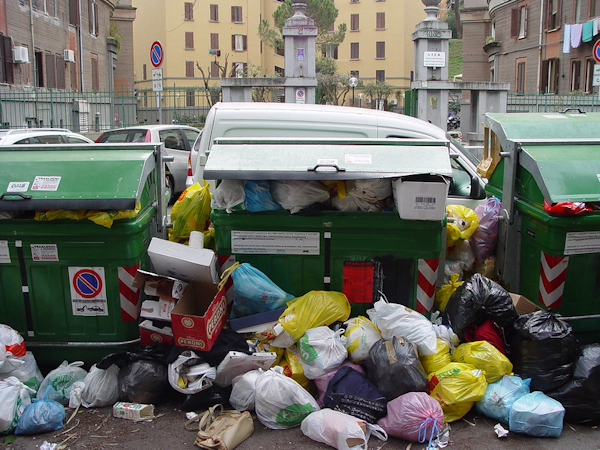SEJournal Online is the digital news magazine of the Society of Environmental Journalists. Learn more about SEJournal Online, including submission, subscription and advertising information.
 |
| Overflowing trash bins in Rome. Photo: Ben Salthouse, Flickr Creative Commons (CC BY-SA 2.0). |
EJ Academy Opinion: On the Mafia To-Do List? Take Out the Trash
By Macy Berendsen
[Editor’s Note: The author won first place for this submission in the Society of Environmental Journalists’ inaugural Student Press Freedom Day Op-Ed Contest. It is published here for the first time on SEJournal Online.]
The Italian Mafia is a highly feared criminal organization whose power is mostly unknown to the average citizen, other than the Hollywood version in movies such as “Goodfellas” and “The Godfather.”
If the real mafia’s real work is kept secret, there’s at least one thing we do know is on its to-do list: collecting the garbage.
If it’s surprising at first to think that the busy and powerful Mafia would have time to be involved with the garbage problem in Italy, especially in Rome, it’s less surprising when you actually look at Rome’s trash problem.
I had that experience in the fall of 2021, when I studied at the University of St. Thomas’ Rome campus, Bernardi. That opportunity led me to all kinds of people and places throughout Italy, from an independent cheese factory high in the mountains to the vegetable vendors in the bustling Campo de Fiori.
Although these places were unforgettable and breathtaking, also unforgettable and breathtaking, in a much different way, was the garbage lining the streets. Rome is one of the dirtiest cities in the world, with much of its history, architecture and culture masked by the smell and sight of waste.
Between the huge tourist population and many businesses and citizens residing there, Rome produces 1.7 million metric tons of the stuff every year. Malagrotta landfill was once the largest landfill in Europe and the only site dedicated to Rome's garbage disposal until it was closed in 2013. Now, there is no major dumpsite for Roman waste.
These days, most of Rome’s rubbish is shipped to other Italian regions or abroad. The capital exports 1.2 million tons of its garbage every year, at a cost of 180 million euros ($187 million). The remaining half-million tons stay uncollected for weeks.
Mob ties to garbage collection
So what’s the organized crime angle? “It’s Mob Economics 101,” writes Michelle Tsai in Slate. “Find a business that’s easy to enter and lucrative to control. … Anyone with a truck and a couple of strong guys can make good money, and there’s always a demand for the service.”
Rome’s garbage collection historically has been tied to organized crime. Legambiente Association, which tracks the Mafia’s environmental fingerprints, recently reported that in 2020 the Lazio region (which includes Rome) had 736 crimes related to waste treatment, 942 complaints, 36 arrests and 391 confiscations. The same association has denounced the city’s roughly 1,000 illegal dumps.
Poor waste management is not just an eyesore. It leads
to global warming, air pollution, damaged ecosystems,
contaminated and toxic waters and is a threat to many species.
Poor waste management is not just an eyesore. It leads to global warming, air pollution, damaged ecosystems, contaminated and toxic waters and is a threat to many species. Landfills release the greenhouse gas methane, which is formed by microorganisms present in landfills from biodegradable waste. It’s no question what contributes to the unpleasant Roman aroma.
Rome’s citizens were fuming over the trash issue. Successive mayors have pledged reforms, but little to no work has been done by the government to solve this issue.
In 2016, Rome’s mayor-to-be, Virginia Raggi, campaigned on the garbage crisis as her primary issue, but during her time in office, promises to address the garbage crisis seemed to disappear.
In October 2021, the newly elected Roman mayor, Roberto Gualtieri, promised a clean city by Christmas. Cash bonuses were even offered to garbage collectors who worked holidays. Gualtieri ordered the repair of 300 garbage trucks and engaged in a deal with the northern city of Mantua to relieve Rome of some of its trash.
The clean Christmas miracle never came.
Citizens grew angrier when FIEPET, an association representing around 4,000 restaurants in Rome, announced revenues have dropped due to trash outside restaurant premises. It was a further wake-up for the political leadership of Rome to take action instead of relaying empty promises to the media.
Journalist voices suppressed
Unfortunately, it’s not clear what the media in Italy can currently accomplish.
The country has one of Europe’s lowest press freedom rankings, ranked 41 out of the 180 countries. Reporters Without Borders said that 20 “Italian journalists are currently receiving round-the-clock police protection because of the intimidation, death threats and attacks to which they have been subjected, above all by criminal organizations and mafia networks.”
Especially in Rome, journalists have been both physically and verbally attacked. Italian journalists have one of the highest numbers of threatened journalists in Europe. The Media Freedom Rapid Response expressed great concern over their safety.
The Italian government itself seems to be contributing to the problem. Derogatory insults were made against journalists covering the corruption trial of Rome Mayor Raggi by two deputy prime ministers. One deputy prime minister took it a step further by threatening to remove police protection for investigative journalists.
This all leaves one of the world’s most beautiful ancient cities littered with dog feces, bags of kitchen trash, endless discarded alcohol bottles and mismatched, tattered shoes. Roman citizens are understandably furious, and travel bloggers commonly warn other visitors that Rome smells and is dirty.
It takes more than just the feared Italian Mafia to keep Rome clean — politicians, citizens, business owners and tourists all have their own responsibility to look out for the city they love and the even more beautiful city it can become, before it’s too late.
Equally important, those pushing to resolve this crisis are being silenced because of the weakened voice of Italian journalists, who are threatened for taking on this crucial problem. All this leaves the Eternal City at risk of becoming eternally tarnished with its trash.
 |
Macy Berendsen is a journalism and English student at the University of St. Thomas in St. Paul, Minnesota. She is a member of her school's news organization TommieMedia, working as a reporter, columnist and podcaster. Originally from Appleton, Wisconsin, Macy studied in Rome, Italy, in the fall of 2021 and is planning a career in journalism.
* From the weekly news magazine SEJournal Online, Vol. 7, No. 20. Content from each new issue of SEJournal Online is available to the public via the SEJournal Online main page. Subscribe to the e-newsletter here. And see past issues of the SEJournal archived here.














 Advertisement
Advertisement 



